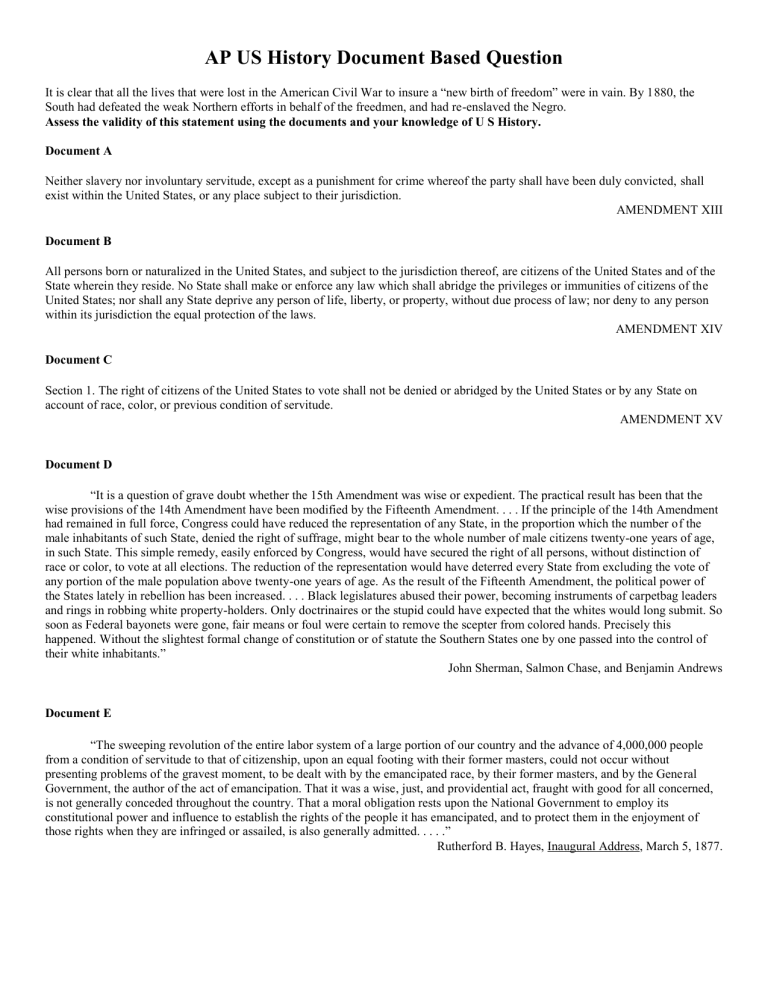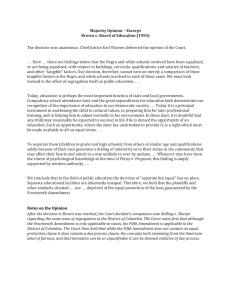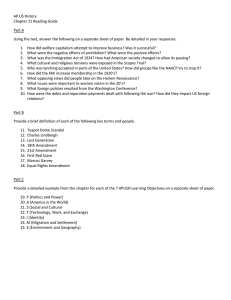AP US History Document Based Question

AP US History Document Based Question
It is clear that all the lives that were lost in the American Civil War to insure a “new birth of freedom” were in vain. By 1880, the
South had defeated the weak Northern efforts in behalf of the freedmen, and had re-enslaved the Negro.
Assess the validity of this statement using the documents and your knowledge of U S History.
Document A
Neither slavery nor involuntary servitude, except as a punishment for crime whereof the party shall have been duly convicted, shall exist within the United States, or any place subject to their jurisdiction.
AMENDMENT XIII
Document B
All persons born or naturalized in the United States, and subject to the jurisdiction thereof, are citizens of the United States and of the
State wherein they reside. No State shall make or enforce any law which shall abridge the privileges or immunities of citizens of the
United States; nor shall any State deprive any person of life, liberty, or property, without due process of law; nor deny to any person within its jurisdiction the equal protection of the laws.
AMENDMENT XIV
Document C
Section 1. The right of citizens of the United States to vote shall not be denied or abridged by the United States or by any State on account of race, color, or previous condition of servitude.
AMENDMENT XV
Document D
“It is a question of grave doubt whether the 15th Amendment was wise or expedient. The practical result has been that the wise provisions of the 14th Amendment have been modified by the Fifteenth Amendment. . . . If the principle of the 14th Amendment had remained in full force, Congress could have reduced the representation of any State, in the proportion which the number of the male inhabitants of such State, denied the right of suffrage, might bear to the whole number of male citizens twenty-one years of age, in such State. This simple remedy, easily enforced by Congress, would have secured the right of all persons, without distinction of race or color, to vote at all elections. The reduction of the representation would have deterred every State from excluding the vote of any portion of the male population above twenty-one years of age. As the result of the Fifteenth Amendment, the political power of the States lately in rebellion has been increased. . . . Black legislatures abused their power, becoming instruments of carpetbag leaders and rings in robbing white property-holders. Only doctrinaires or the stupid could have expected that the whites would long submit. So soon as Federal bayonets were gone, fair means or foul were certain to remove the scepter from colored hands. Precisely this happened. Without the slightest formal change of constitution or of statute the Southern States one by one passed into the control of their white inhabitants.”
John Sherman, Salmon Chase, and Benjamin Andrews
Document E
“The sweeping revolution of the entire labor system of a large portion of our country and the advance of 4,000,000 people from a condition of servitude to that of citizenship, upon an equal footing with their former masters, could not occur without presenting problems of the gravest moment, to be dealt with by the emancipated race, by their former masters, and by the General
Government, the author of the act of emancipation. That it was a wise, just, and providential act, fraught with good for all concerned, is not generally conceded throughout the country. That a moral obligation rests upon the National Government to employ its constitutional power and influence to establish the rights of the people it has emancipated, and to protect them in the enjoyment of those rights when they are infringed or assailed, is also generally admitted. . . . .”
Rutherford B. Hayes, Inaugural Address, March 5, 1877.
Document G
Document F
Thomas Nast,
Harpers’s Weekly
, October 24 , 18 74
“A prominent Democratic politician, describing a reconstruction governor of his State, whom he had done his best to overthrow, said:
"I regard him as a thoroughly honest man and opposed to corruption and extravagance in office. . . . but the want of sympathy between him and the white people of the State, and his failure to appreciate the relations and prejudices of the two races, made it next to impossible for him to succeed . . . . The good carpet-baggers and the bad alike somehow exerted an influence which had the effect of morbidly inflaming the negro's sense of independence and of engaging him in politics. The negro was too apt a pupil, not in the higher politics of principle, but in the politics of office and "swag." In 1872 the National Colored Republican Convention adopted a resolution "earnestly praying that the colored Republicans of States where no Federal positions were given to colored men might no longer be ignored, but be stimulated by some recognition of Federal patron-age." "The reformers complain of taxes being too high," said Beverly Nash in 1874, after he had become State Senator; "I tell you that they are not high enough. . . . . In their days of serfdom the negroes' besetting sin had been thievery. Now that the opportunities for this were multiplied, the fear of punishment gone, and many a carpet-bagger at hand to encourage it, the prevalence of public and private stealing was not strange . . . . There were said to be in South Carolina alone, in November, 1874, two hundred negro trial justices who could neither read nor write, also negro school commissioners equally ignorant, receiving a thousand a year each, while negro juries, deciding delicate points of legal evidence, settled questions involving lives and property.”
Benjamin Andrews
Document H
“FOURSCORE and seven years ago our fathers brought forth on this continent a new nation, conceived in liberty, and dedicated to the proposition that all men are created equal. Now we are engaged in a great civil war, testing whether that nation, or any nation so conceived and so dedicated, can long endure. We are met on a great battlefield of that war. We have come to dedicate a portion of that field as a final resting-place for those who here gave their lives that the nation might live. It is altogether fitting and proper that we should do this. But, in a larger sense, we cannot dedicate, we cannot consecrate, we cannot hallow this ground. The brave men, living and dead, who struggled here have consecrated it, far above our poor power to add or detract. The world will little note, nor long remember, what we say here, but it can never forget what they did here. It is for us the living, rather, to be dedicated here to the unfinished work which they who fought here have thus far so nobly advanced. It is rather for us to be here dedicated to the great task remaining before us that from these honored dead we take increased devotion to that cause for which they gave the last full measure of devotion that we here highly resolve that these dead shall not have died in vain, that this nation, under God, shall have a new birth of freedom and that government of the people, by the people, for the people, shall not perish from the earth.”
Abraham Lincoln, November 1863
Document I
"If we are called on to do military duty against the rebel armies in the field, why should we be denied the privilege of voting against rebel citizens at the ballot-box? The latter is as necessary to save the Government as the former. . . . The Government has asked the colored man to fight for its preservation and gladly has he done it. It can afford to trust him with a vote as safely as it trusted him with a bayonet. . . . At present we can have only partial protection from the courts. . . . If this order of things continue, our people are destined to a malignant persecution at the hands of rebels and their former rebellious masters. . . . because the courts will not receive
Negro testimony. . . . Is this the fruit of freedom, and the reward of our services in the field?
There have been white traitors in multitudes in Tennessee, but where we ask, is the black traitor?
Petition from American citizens of African descent to the Union convention of Tennessee assembled in the capitol at Nashville,
January 9, 1865.
Document J
"General:
We want Homesteads; we were promised Homesteads by the government. If It does not carry out the promises Its agents made to us,…we are left in a more unpleasant condition than our former. We are at the mercy of those who are combined to prevent us from getting land enough to lay our Fathers bones upon. . . .
To the President of these United States:
Shall not we who Are freedman and have been always true to this Union have the same rights as are enjoyed by Others? . . .
Are not our rights as A free people and good citizens of these United States?To be considered before the rights of those who were
Found in rebellion against this good and just Government (and now being conquered) come (as they Seem) with penitent hearts and beg forgiveness For past offenses and also ask if thier [sic] lands Cannot be restored to them. Are these rebellious Spirits to be reinstated in thier [sic] possessions And we who have been abused and oppressed For many long years not be allowed the Privilege of purchasing land But be subject To the will of these large Land owners? God forbid. . . . Unless some provision is Made our future is sad to look upon. . . . We therefore look to you In this trying hour as A true friend of the poor and Neglected race, for protection and
Equal Rights, with the privilege of purchasing A Homestead - A Homestead right here in the Heart of South Carolina."
The Freedmen of Edisto Island Petition to the Commissioner of the Freedmen's Bureau and to the President for the Opportunity to
Obtain Their Own Land, Edisto Island, S.C., October 1865.
Document K
Document L

